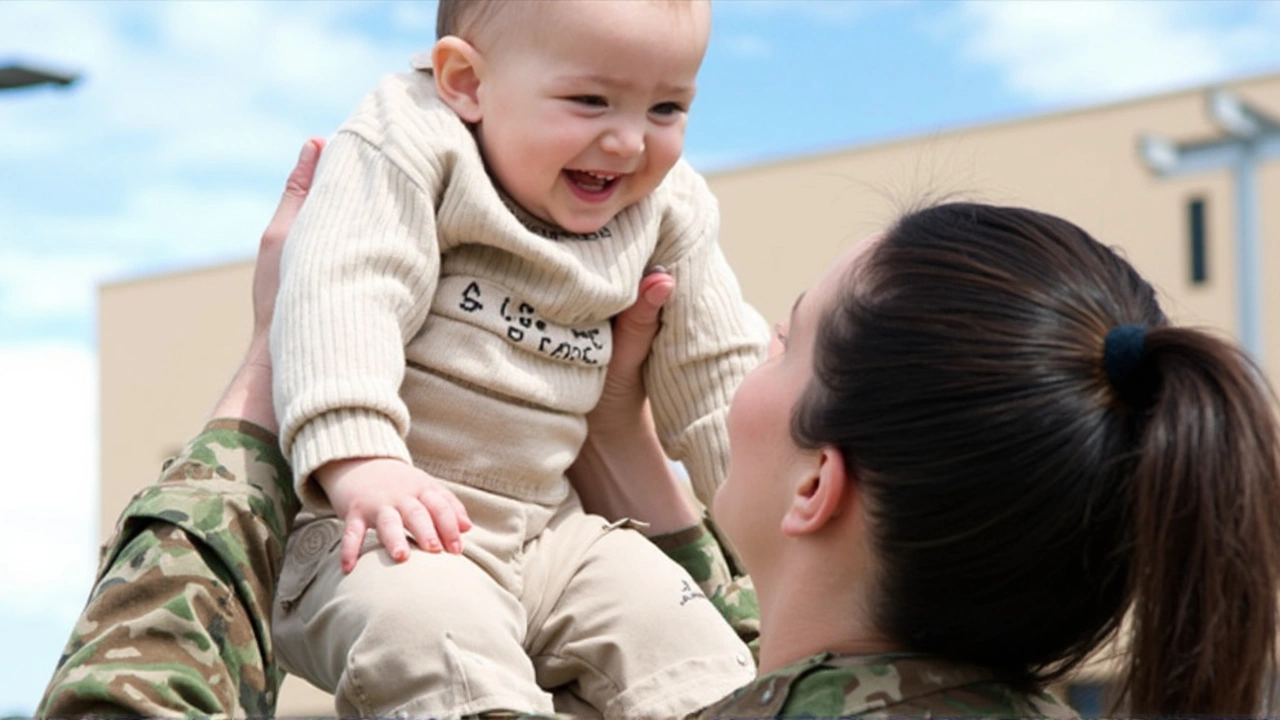The Changing Landscape of Air Force Family Days
Big changes could be coming for Air Force personnel who look forward to four-day weekends. The Department of the Air Force has kicked off a full review of its Family Days program, questioning whether these bonus days off really fit with the need for constant readiness. The February 11, 2025, memo landed with a clear message: It's time to analyze if granting extended breaks still makes sense as the military gears up for an unpredictable global landscape.
Back in the day, Family Days were seen as a simple way to boost morale by attaching an extra break to long holiday weekends. Units would pause meetings and routine business, giving service members a well-earned breather while still keeping mission-critical jobs staffed. Gwendolyn DeFilippi, currently leading Manpower and Reserve Affairs, explains that commanders retain some flexibility—if duty calls, airmen can swap in compensatory time later. However, the underlying question remains: Does regular time off mesh with an urgent focus on operational discipline and preparedness?

Civilian Leave Rules: More Red Tape, Less Flexibility
This review isn’t just about those in uniform. Civilians working for the Air Force have always faced stricter limitations. Federal law says no to handing out paid Family Days to civilian staff. The workaround? "Liberal leave"—a policy where supervisors can let civilians use accumulated vacation, compensatory hours, or previously approved time-off awards. Sounds simple enough, but in practice, it means civilians must dip into their own leave accounts just to match the perks their military co-workers enjoy on these special days.
Supervisors get some leeway in making this work, but there’s still a balancing act between keeping families happy and making sure nobody slacks off on vital duties. Every federal agency deals with these headaches in some form, but the Air Force’s renewed focus on readiness brings the issue front and center right now.
The past few months have already given airmen a taste of what’s to come. Air Mobility Command, which plays a key role in rapid transport and logistics, decided to axe four Family Days scheduled for 2025. Their argument? With mission priorities high, they can’t justify the time off. Other commands, however, still hold on to more generous policies—take Global Strike Command with 11 scheduled days, or Education and Training Command with six. This patchwork approach highlights how each group sets its own pace based on what matters most to their particular mission.
The review isn’t happening in a vacuum. Earlier this year, Air Force Chief of Staff Gen. David W. Allvin rolled out fresh standards for uniforms and grooming. The push is all about tightening the ship: more professionalism, less wiggle-room, even down to how you wear your hair or your badges. These tweaks, combined with the Family Days debate, show just how serious leadership is about squeezing out every ounce of focus across the ranks.
With threats and tensions rising around the world, the service is doubling down on the basics—discipline, training, and, above all, readiness. How the rules on civilian leave and perks like Family Days will settle remains to be seen, but one thing is clear: Airmen and civilian staff alike should brace for a more unified, mission-first mindset in the near future.







16 Comments
When you think about those four‑day weekends, you can almost hear the collective sigh of relief echoing through the hangars-only to be replaced by the sharp clang of readiness bells. It feels like a tug‑of‑war between personal joy and the unyielding cadence of duty! The memo landed like a thunderclap, demanding us to weigh morale against the ever‑looming specter of global uncertainty. Yet, every airman knows that a rested crew is a sharper crew, and the heart of the Force beats strongest when its people feel cared for. So while the review may seem cold, the underlying hope is that we find a balance that doesn’t sacrifice the spirit of the wing.
For civilian staff the “liberal leave” workaround essentially means they must dip into their own accrued vacation to line up with the service members’ Family Days. Federal regulations prohibit a direct paid Family Day benefit, so supervisors are left to juggle vacation balances, compensatory hours, or pre‑approved time‑off awards. This can create inequities, especially when some commands keep generous schedules while others cut them back. One way to mitigate the impact is to standardize a baseline of compensatory days across the Air Force, ensuring civilians aren’t forced to sacrifice earned leave. Transparency in how those days are allocated can also help maintain morale without breaching the law.
Family Days boost morale but readiness must stay top priority.
It is curious how we equate the quantity of days off with the quality of discipline; perhaps the true metric is not the calendar but the mindset we cultivate when the uniform hangs on our backs. A command that trims holidays to sharpen focus might inadvertently dull the spirit that fuels resilience. Conversely, endless leisure can erode the edge hard‑won in training. The balance, then, is not a simple arithmetic of days, but a nuanced choreography of duty, rest, and purpose-a dance that each unit must compose for itself.
Oh dear! The Air Force is once again stepping into the arena of policy‑making!!! Family Days-once a cherished perk-are now under the microscope!!! We must ask ourselves: is sacrificing our precious time off the only path to unwavering readiness??? Surely, there must be a middle ground!!!
Sure, because cutting a few extra days will magically make the whole world safer. As if the universe cares about a Friday off.
Listen up-if we think short‑changing our families will somehow boost combat power, we’re dead wrong. A united force with happy families is an unstoppable machine, and any attempt to chip away at that cohesion is a direct attack on operational strength. Stand firm, demand fair leave, and keep the morale engine roaring.
Esteemed colleagues, let us consider that disciplined preparation and personal rejuvenation are not mutually exclusive. By fostering a culture where rest is respected, we empower airmen to return to duty with heightened vigilance and resolve. Therefore, I encourage command leadership to seek innovative scheduling solutions that honor both mission imperatives and the well‑being of our personnel.
From a global standpoint, many air forces grapple with the same tension between operational tempo and work‑life balance. Nations that invest in structured downtime often report higher retention and sharper response times. It would be prudent for the U.S. Air Force to study these models, adapt best practices, and ensure our policies reflect both our strategic needs and the human element that fuels them.
Great to see the conversation heating up! 😄 A little optimism goes a long way-maybe we can find a win‑win that keeps both readiness high and spirits lifted! 🌟
In assessing the ramifications of the Family Days review, one must first delineate the operational tempo metrics that underpin Air Force readiness postures. The current force generation model incorporates a series of tempo buffers, which are calibrated against both strategic surge requirements and sustainment cycles. When supplemental leave is introduced, it intersects with these buffers, potentially compressing the window for mission rehearsal and force projection. Furthermore, the civilian workforce contributes critical support functions, from logistics planning to intelligence analysis, that are classified under the total force employment equation. Any diminution in civilian availability necessitates a recalibration of manpower allocation matrices, often resulting in increased overtime utilization and associated fatigue indices. The Department of Defense's directive on force health protection underscores the importance of mitigating cumulative fatigue, a parameter directly influenced by leave policies. Empirical studies from joint service evaluations indicate a statistically significant correlation between periodic rest periods and mission execution accuracy, particularly in high‑stress operational environments. Conversely, the absence of standardized leave frameworks can engender disparities across commands, leading to uneven readiness postures that may compromise joint interoperability. It is also essential to factor in the opportunity cost associated with reassigning compensatory time, which can affect training pipelines and certification timelines. Additionally, the fiscal implications of extended leave accrue through both direct compensation and indirect costs related to workforce attrition. A holistic cost‑benefit analysis should therefore integrate both quantitative readiness metrics and qualitative morale indicators. Leadership must also consider legislative constraints on civilian leave, which limit the scope of policy adjustments without statutory amendment. Coordination with the Office of the Secretary of Defense may be required to align any proposed modifications with broader defense personnel policies. Ultimately, the strategic calculus should prioritize a synergistic approach that harmonizes operational imperatives with the human capital considerations that underpin sustained air superiority. By embracing a data‑driven stance, the Air Force can ensure that leave policies serve as a force multiplier rather than a liability.
While the analysis is thorough, it's disheartening to see the discussion reduced to spreadsheets when the real issue is the well‑being of our people. Sacrificing personal time for abstract metrics feels like a moral compromise we shouldn't accept.
I hear the concerns raised and appreciate the depth of the data presented 😊 It's vital we remember that behind each metric is a human being who deserves both purpose and rest.
We need a balance that respects both mission and family
Absolutely!!! A balanced approach is not just a nice‑to‑have, it is essential!!! We must advocate for policies that protect our service members’ downtime while still meeting operational demands!!!
Time will tell which path strengthens the force.